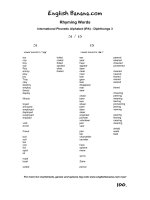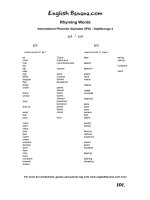talk a lot why bother learning the international phonetic alphabet ipa
Bạn đang xem bản rút gọn của tài liệu. Xem và tải ngay bản đầy đủ của tài liệu tại đây (31.37 KB, 2 trang )
Talk a Lot
Learn the International Phonetic Alphabet (IPA)
Why Bother Learning the International Phonetic Alphabet?
It’s simple…
…if you can read the sounds of English with the International Phonetic Alphabet, you
will be able to correctly pronounce every single word in an English dictionary. You will
become a more independent learner, because you won’t need to rely on asking your friends
or teacher – or native speakers – “How do you say this word?” It may seem like a daunting
challenge when you first look at the chart on p.18.6, and learning the IPA will take a bit of
effort – like just about every other worthwhile activity in life – but once you’ve learned to
recognise the symbols, and which sounds they represent, you’ll remember them and be able
to use this valuable skill as you continue learning English throughout the rest of your life.
You don’t have to learn the entire IPA anyway – that’s not necessary. Just the sounds of
English, and sounds that your language has but which English does not have. The IPA covers
all of the languages of the world, but you need only focus on learning the 48 sounds of
English.
As you learn, you will better understand the differences between pronunciation in your
language and English. For example, I teach English in Poland, where all of my students
speak Polish (as you would expect). In Polish there are only 8 vowel sounds, while in English
there are 23. In Polish there are no long vowel sounds, like LìWL or L^WL and no diphthongs,
like LÉfL or L]rL. Before I began to teach the IPA in my classes, one of the most common
causes of pronunciation mistakes used to be when students tried to speak English using only
the 8 vowel sounds of Polish, instead of the 23 vowel sounds of English. Their words sounded
clipped and unnatural, without any long vowel sounds or diphthongs. They spoke like that
because that was how they understand language to be: “If it’s like that in my language, it must
be like that in English too.”
You will also be able to focus in on problem areas in your spoken English by identifying which
specific sounds you are having problems with. For example, my Polish students find the two
consonant sounds LqL and LaL really difficult, because they don’t have these sounds in
Polish. They didn’t learn to make these sounds when they first learned to speak. Furthermore,
they don’t want to stick their tongues out between their teeth when they speak, as LqL and
LaL demand! Other sounds that are difficult for them include the vowel sounds L‰WL and L¾L,
so we always spend more time practising words with these sounds.
A note about the schwa
This sound, L]L, which is called a schwa, is worth spending extra time studying, because it is
the most common sound in English. It’s the weak stress sound of the articles “a” L]L and “the”
La]L and appears in the unstressed syllables of the majority of English words with more than
one syllable. (If you don’t believe me, have a look at the Discussion Words from Books 1 and
2, from pp.18.29-18.38, and see how many schwas you can count!)
So, how do I go about learning the IPA?
If you’re learning on your own, you could use the flashcards (starting on p.18.9) to memorise
the sounds, and test yourself, as well as using the worksheets (starting on p.19.1) and tests
(starting on p.19.17) that are included in this handbook. Look online on the Talk a Lot pages
For more fun worksheets, games and quizzes log onto www.englishbanana.com now!
Talk a Lot Elementary
English Banana.com
18.1
Talk a Lot
Learn the International Phonetic Alphabet (IPA)
Why Bother Learning the International Phonetic Alphabet?
for our .mp3 file “The Sounds of English…”, on which you can hear each sound being spoken.
Learning the sounds of English with the IPA is one of the best things you could do to improve
your level of spoken English.
…or how do I teach it to my class?
You could follow the lesson plan on p.18.3 for guidance on how to introduce the sounds of
English with the IPA to a group of Elementary-Pre-Intermediate learners, and then use the
materials in this handbook to consolidate learning (see p.19.1 onwards). The IPA may not
seem like an easy topic to teach, but your students will enjoy it, and later on they’ll thank you
for covering it with them. If you give them the chance to learn the sounds of English with the
IPA, their spoken English will improve as their understanding of the language – including
stress and vowel sounds – increases. You’ll be giving them a gift that keeps on giving. A gift
that’s for life, not just for one lesson! Good luck!
For more fun worksheets, games and quizzes log onto www.englishbanana.com now!
Talk a Lot Elementary
English Banana.com
18.2









